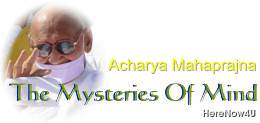
Fearlessness is the core of all religions. Mahavira said, "One who is not fearless cannot be a votary of ahimsa, truth, celibacy, non-covetousness, etc." It is fear, which compels man to commit violence and theft, to tell lies and to accumulate riches. It is fear which has resulted in the invention and stockpiling of all kinds of weapons. Nations are afraid of each other, and, therefore, they seek protection in armaments. Fear causes more fear. From the weapons made of stone we have come to atomic weapons capable of devastating the entire world. We cause injury to others and kill them out of fear. We tell lies because we are afraid of telling the truth. It is fear, which is the root-cause of all kinds of malpractices in trade and commerce. It is fear, which makes us accumulate riches and wealth. It is the cause of all kinds of evils. Freedom from fear means freedom from all kinds of evils.
We need a religion, which is not based on fear. We should not be afraid that we would go to hell if we relinquished religion. If one adopts religion for the fear of hell, he is not a truly religious man.
Like fear, temptations are another cause of deforming religion. Religion has been forced to commit suicide as it were. People have forgotten the essence of religion and have begun to look for returns from it like the heaven where they will be lovingly received and garlanded by handsome fairies and wealth and comfort in this world.
Mothers create a sense of fear in the minds of their children from the very beginning of the latter's life by threatening them that if they did this or that, they will go to hell. This develops complexes in the minds of the children and they become cowards. It creates a sense of inferiority in our minds. As a matter of fact religion has nothing to do with fear. It begins where fear ends. The sole aim of religion is nirjara or a state in which there is no fear and in which all the effects of the past have been controlled and eradicated. It is through religion that we can attain pure consciousness. Self-exertion and religion enable us to eradicate predilections, fear, and temptations and to lead us to spiritual quietitude.
The main question before us is how to affect a complete transformation of our personalities. This can be done by making the subconscious conscious or in other words to arouse the soul. Let us consider the method of arousing the soul or of making the subconscious mind conscious. The structure and system of the glands in our body come under the category of the subconscious mind. They affect the brain also and are more valuable than it. We have to activate this system. It is by activating it that we can get rid of fear and all kinds of ordeals. Physiology has not yet been able to hit upon the method of activating the glandular system. The spiritualists have suggested a practical method.
Breath perception, body perception, self-perception and meditation on the lesyasor colorations of the soul are methods of a harmonious acceleration of glandular activity. If we meditate on the glands, which are the centres of consciousness, they will become active. Their activity will destroy fear and other emotions and open a new field of joy, enthusiasm and vigour for us.
One of the participants in the sadhana camp told me that he had a strange experience in his meditation, which he had never had before. He felt that his glands had become active. I told him that what he had experienced is called apurva karma. Apurva means what has not happened before. Karma means a state of the mind. Apurva karma means a state of mind, which has never before been experienced. A practitioner experiences this state of the mind twice in the course of his meditations. It first happens when right perception has been arrived at. It happens a second time when the practitioner ascends the ksapaka sreni or a special stage of meditation, which leads to sukla dhyana (meditation on white colour). The practitioner passes through these two stages, which along with other stages are arranged in a hierarchical order one above the other.
Meditation on the centres of consciousness is the only means of spiritual progress. Body perception is not an unimportant exercise. You may very well ask as to what the sense is in perceiving the body which is only a heap of flesh, bones, glands, nervous complexes, etc. If the practitioner perceived only these, he will certainly remain an extrovert. He has to go deeper so that he may perceive the glow of the soul beneath the physiological contents of the body. Most of the practitioners do not dive so deep into the body.
Another practitioner complained that when he settled down to meditate for the first time, he felt as if he was wasting his time. The time wasted in meditation could be profitably employed elsewhere. Sitting idle with closed eyes for an hour or so is certainly not a profitable job. A profitable job is one, which produces tangible results. For example, eating food satisfies hunger. The pursuit of knowledge enables one to collect useful information. What does one get from meditation? The meditator will not be able to say what he had achieved.
There are thousand of research-centres financed by industrialists where various investigations are being conducted by highly qualified scientists. The financiers do not know the nature of the work being done in these centres and its complicated nature. The research workers are often faced with perplexing problems the solution of which needs a lot of time and energy. The directors of these centres cannot appreciate the difficulties faced by the research workers. For example, the uncertainty of a single technical word takes enormous time and energy to fix an exact meaning of it. The research workers have to do a lot of hard thinking before they can arrive at some definite conclusion. The directors, on the other hand, go by how much work has been done and they assess the value of the work in terms of the investment, which has been made, and the monetary returns the work brings. Such an attitude is harmful in sadhana. Those engaged in sadhana have a long way to wade through and they often lose patience.
I sincerely believe that each and every true practitioner gains some thing or the other if he is sincere. Those who have participated in the sadhana camps have come to develop a strong hunger for spiritual experiences and would like to continue their exercises. The search for the self is a great endeavour. It is the basic instinct of man and is bound to produce substantial results.
Breath perception, body perception, perception of normal breath, lesya meditation and kayotsarga are the means of transforming personality. Didactic sermons exhorting people to be religious are certainly unprofitable. Experience is the only valuable thing. If the practitioner observed the rules of his game, he will certainly experience the expansion of his consciousness and his self-exertion will enable him to gain control over his passions and emotions.
 Acharya Mahaprajna
Acharya Mahaprajna

